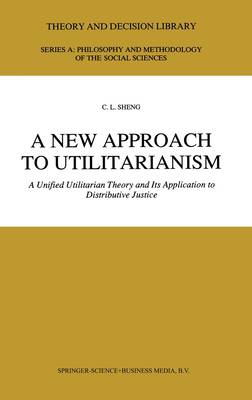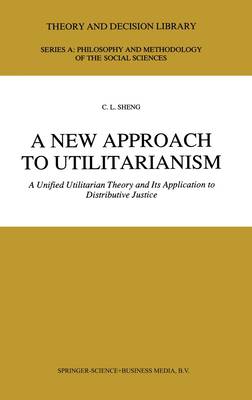
- Retrait gratuit dans votre magasin Club
- 7.000.000 titres dans notre catalogue
- Payer en toute sécurité
- Toujours un magasin près de chez vous
- Retrait gratuit dans votre magasin Club
- 7.000.0000 titres dans notre catalogue
- Payer en toute sécurité
- Toujours un magasin près de chez vous
A New Approach to Utilitarianism
A Unified Utilitarian Theory and Its Application to Distributive Justice
Ch'ing-Lai Sheng, C L Sheng, Qinglai Sheng
151,45 €
+ 302 points
Description
I: A Unified Utilitarian Theory.- 1 Introduction.- 1.1 Utilitarian Theories.- 1.2 A New Scientific Approach to Utilitarianism.- 1.3 Difficulties with Utilitarianism.- 1.4 Deduction and Statistics.- 1.5 The Importance of Normative Ethics.- 1.6 Moral Philosophy and Social Philosophy.- 1.7 The Scope of This Book.- 2 A Particular Interpretation of Utilitarianism.- 2.1 The Problem of Interpretation.- 2.2 Good and Right - Positive and Negative Duties.- 2.3 The Flexible Nature of Morality and a Classification of Situations of Action.- 2.4 Schism of Utilitarianism and Interpretation of the Ultimate Criterion.- 2.5 Implications of Flexibility and Reformulation of Utilitarianism.- 2.6 The Importance of Virtues.- 3 Basic Principles.- 3.1 Basic Principles.- 3.2 Prima Facie Nature.- 3.3 Strictness of Rules in Ethical Theories.- 3.4 The Principle of Utility.- 3.5 The Principle of Nature.- 3.6 Principle of Coexistence.- 4 A Theory of Value.- 4.1 Establishing a Theory of Value.- 4.2 The Problem of Determination of Utility and Value.- 4.3 Classification of Values.- 4.4 Clarification of Some Concepts Related to Utility.- 4.5 Definition of Utility.- 4.6 General Properties of Value.- 4.7 Comparison with Existing Theories of Value.- 4.8 On Right, Obligatory and Ought.- 5 Decision-Making and Moral Action.- 5.1 The Nature of Decision-Making.- 5.2 Applications of Decision-Making.- 5.3 Additive and Multiplicative Weights.- 5.4 Feeling of Moral Satisfaction as a Decisive Factor in Moral Decision-Making.- 5.5 Decision-Making under Conditions of Uncertainty.- 5.6 Utility and Utility Functions.- 5.7 Clarification of the Concepts of Value and Utility.- 5.8 A Mathematical Model for Moral Decision-Making.- 6 Moral Judgment and Justification.- 6.1 The Statistical Nature of Moral Judgment.- 6.2 Value of Moral Principle, Virtue, or Moral Rule.- 6.3 Value of Consequences of a Moral Action.- 6.4 Moral Value of the Feeling of Moral Satisfaction.- 6.5 Value of Motive or Intention.- 6.6 Value of a Moral Action.- 6.7 Value of a Person.- 6.8 Justification for Moral Judgment.- 6.9 On Mill's "Proof" of the Principle of Utility.- 6.10 An Answer to "Why Do We Take Moral Actions?".- 7 Comparisons with Other Theories.- 7.1 Comparison of the Unified Utilitarian Theory with Existing Forms of Utilitarianism.- 7.2 Brief Comparison of Utilitarianism and Deontologism.- 7.3 Defense of Utilitarianism Against Charges Raised by Rights-Theorists and Other Nonutilitarianism.- 7.4 Arguments Against Rights-Theory.- 7.5 Utilitarian Interpretation of Absolute Rights.- 8 Summary, Refutation of Objections, and a General View.- 8.1 Summary of the Unified Utilitarian Theory.- 8.2 Refutation of Objections to Utilitarianism.- 8.3 Compatibility of Utilitarianism with the Principle of Justice.- 8.4 A New Look at Moral Philosophy.- 8.5 Scientific Approach and Systems Theory.- II: A Utilitarian Theory of Distributive Justice.- 9 The General Distribution Problem and Distributive Justice.- 9.1 Various Distribution Problems.- 9.2 Income and Wealth.- 9.3 Freedom, Right, Conflict and Justice.- 9.4 Equality As a Crude Criterion for the Resolution of Conflict.- 9.5 Existing Views of Distributive Justice.- 9.6 A Utilitarian Theory of Distributive Justice.- 10 Maximization of Utility and the Objective Function.- 10.1 The Other Sense of Utility and Marginal Utility.- 10.2 Law of Diminishing Incremental Interest.- 10.3 Utility of Money Versus von Neumann-Morgenstern Utility.- 10.4 A General Utility Function.- 10.5 Interpersonal Comparisons of Utility.- 10.6 On Normalization and Terminal Utilities.- 10.7 On Recent Developments in Utility and Risk Theory.- 10.8 The Social Welfare Function as an Objective Function.- 11 The Constraint.- 11.1 Optimization and Constraint.- 11.2 Comments on Pareto Optimality as a Constraint.- 11.3 Comments on Rawls' Difference Principle.- 11.4 Constant Total Value as a Constraint.- 11.5 The Dynamic Nature of Distribution.- 11.6 Utilitarianism Is Not Indifferent to Distribution.- 1...
Spécifications
Parties prenantes
- Auteur(s) :
- Editeur:
Contenu
- Nombre de pages :
- 596
- Langue:
- Anglais
- Collection :
- Tome:
- n° 5
Caractéristiques
- EAN:
- 9780792313014
- Date de parution :
- 31-07-91
- Format:
- Livre relié
- Format numérique:
- Genaaid
- Dimensions :
- 156 mm x 234 mm
- Poids :
- 1006 g

Les avis
Nous publions uniquement les avis qui respectent les conditions requises. Consultez nos conditions pour les avis.






